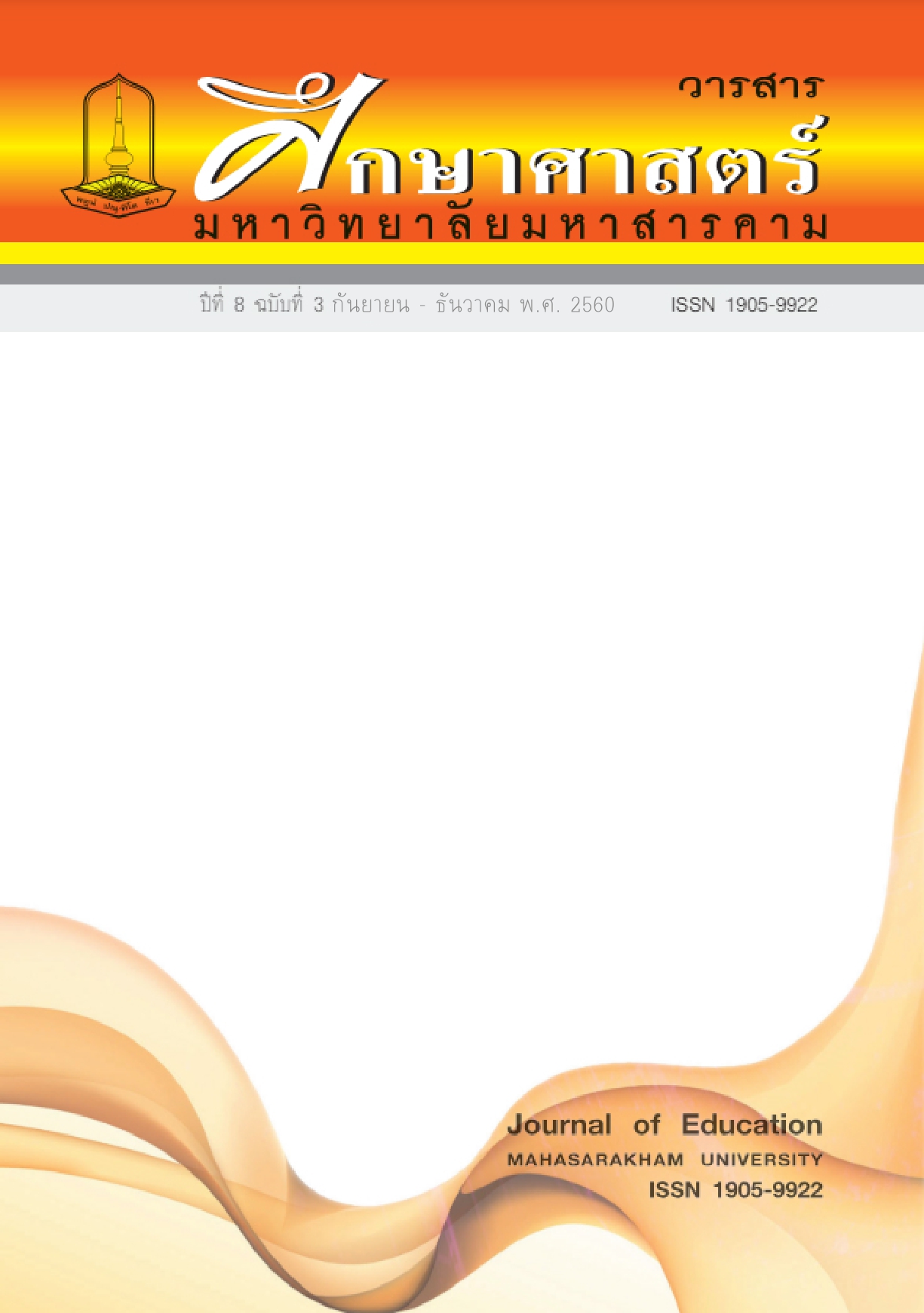The Development of Learning Achievement and Integrated Science Process Skills of Mattayomsuksa 2 Students through STEM Education
Main Article Content
Abstract
The objectives of this research aimed to study learning achievement and integrated science process skills through STEM education, entitled “Food and living” for Mattayomsuksa 2 students. Target group consisted of 13 Mattayomsuksa 2/1 students attending in the second semester of academic year 2016, Dongyaiwittayakhom Ratchamunangkhalabhisek school, Wapipathum district, Mahasarakham province. Research instruments used in this study were 8 lesson plan STEM education, learning achievement test, integrated science process skills test, and anecdotal on STEM education. The statistics used for analyzing data were percentage, mean, and standard deviation. Findings revealed that that first cycle students had 69.38% of learning achievement and 69.58% of integrated science process skills. Then, second cycle students had 80.00% of learning achievement and 79.19% of integrated science process skills.
Downloads
Article Details
References
ธีรวุฒิ เอกะกุล. (2551). การวิจัยเชิงปฏิบัติการ. อุบลราชธานี: ยงสวัสดิ์อินเตอร์กรุ๊ป 2552.
ประสาท เนืองเฉลิม. (2558ก). จุดมุ่งหมายของการเรียนการสอนวิทยาศาสตร์ในศตวรรษที่ 21. วารสารศึกษาศาสตร์ มหาวิทยาลัยมหาสารคาม. 9(4): 7-14.
ประสาท เนืองเฉลิม. (2558ข). การเรียนรู้วิทยาศาสตร์ในศตวรรษที่ 21. กรุงเทพฯ: สำนักพิมพ์แห่งจุฬาลงกรณ์มหาวิทยาลัย.
พรทิพย์ ศิริภัทราชัย. (2556). STEM Education กับการพัฒนาทักษะในศตวรรษที่ 21. นักบริหาร. 33(2): 49-56.
พลศักดิ์ แสงพรมศรี ประสาท เนืองเฉลิม ปิยะเนตร จันทร์ถิระติกุล (2558). การเปรียบเทียบผลสัมฤทธิ์ทางการเรียน ทักษะกระบวนการทางวิทยาศาสตร์ขั้นสูง และเจตคติต่อการเรียนเคมีของนักเรียนชั้นมัธยมศึกษาปีที่ 5 ที่ได้รับการจัดการเรียนรู้สะเต็มศึกษากับแบบปกติ. วารสารศึกษาศาสตร์ มหาวิทยาลัยมหาสารคาม. 9: 401-418.
โรงเรียนดงใหญ่วิทยาคม รัชมังคลาภิเษก. รายงานผลสัมฤทธิ์ทางการเรียน. โรงเรียนดงใหญ่วิทยาคมรัชมังคลาภิเษก, 1/2558
รักษพล ธนานุวงศ์. (2556ก). รายงานสุปการประชุมเชิงปฏิบัติการ STEM Education.สืบค้นวันที่ 15 มีนาาคม 2559 จาก http//www.Slideshare.net/focusphysics/stemworkshopsummary.
รักษพล ธนานุวงศ์. (2556ข). เรียนรู้สภาวะโลกร้อนด้วย STEM Education แบบบูรณาการ. นิตยสาร สสวท. 41(182), 15-20.
สถาบันส่งเสริมการสอนวิทยาศาสตร์และเทคโนโลยี. (2557). การจัดสาระการเรียนรู้ กลุ่มวิทยาศาสตร์หลักสูตรการศึกษาขั้นพื้นฐาน. กรุงเทพฯ: สถาบันส่งเสริมการสอนวิทยาศาสตร์และเทคโนโลยี
สุพรรณี ชาญประเสริฐ. (2556). หลักสูตรกับการจัดการเรียนรู้วิชาเคมี. นิตยสาร สสวท. 41(180): 34-37.
สุพรรณี ชาญประเสริฐ. (2557). สะเต็มศึกษากับการจัดการเรียนรู้ในศตวรรษที่ 21. นิตยสาร สสวท. 42(186), 3-5.
อภิสิทธิ์ ธงไชย. (2556). สะเต็มศึกษากับการพัฒนาการศึกษาวิทยาศาสตร์ เทคโนโลยี วิศวกรรมศาสตร์และคณิตศาสตร์ในประเทศสหรัฐอเมริกา. สมาคมครูวิทยาศาสตร์ คณิตศาสตร์และเทคโนโลยีแห่งประเทศไทย, 19 (มกราคม – ธันวาคม 2556), 15-18
Breiner, J.M., Caela, C.J., Harkness, S.S. and Koehler, C.M. (2012). What is STEM? A discussion about conceptions of STEM in education and partnerships. School Science and Mathematics. 112(1): 3-11.
Han, S., Capraro, R., & Capraro, M. M. (2015). How science, technology, engineering, and mathematics (STEM) project-based learning (PBL) affects high, middle, and low achievers differently: The impact of student factors on achievement. International Journal of Science and Mathematics Education. 13(5): 1089-1113.
Laboy-Rush, D. (2011). Integrated STEM education through project-based learning. http://www. rondout. k12. ny. us/common/pages/DisplayFile.aspx.
O’Neil, T.L., Yamagata, J.Y. and Togioka, S. (2012). Teaching STEM means teacher learning. Phi Delta Kappan. 94(1): 36–40.
Scott, C. (2012). An investigation of Science, Technology, Engineering and Mathematics (STEM) focused high school in the U.S. Journal of STEM Education. 13(5): 30–39.
Tseng, K. H., Chang, C. C., Lou, S. J., & Chen, W. P. (2013). Attitudes towards science, technology, engineering and mathematics (STEM) in a project-based learning (PjBL)environment. International Journal of Technology and Design Education. 23(1): 87-102.


